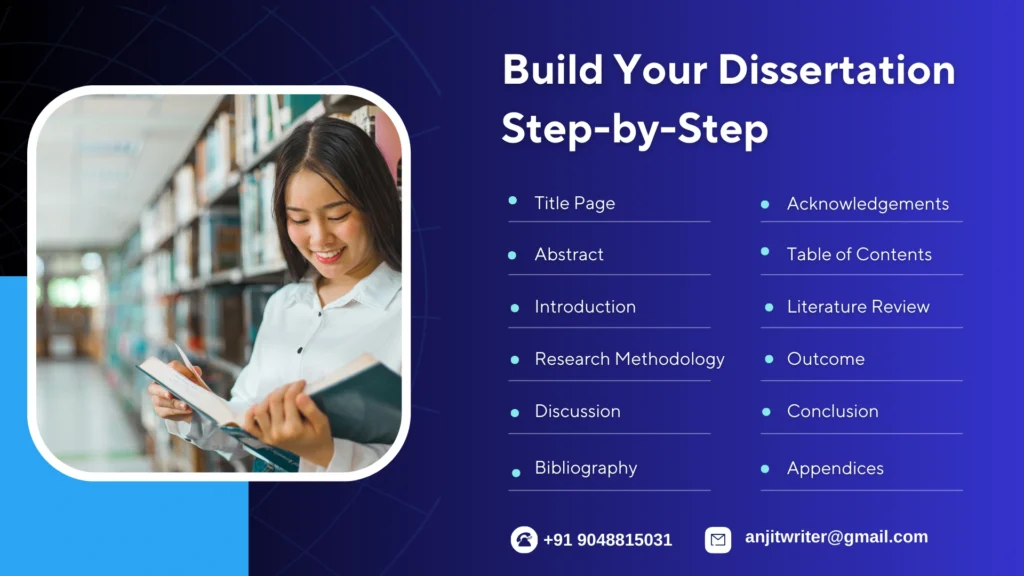Are you in a dilemma over your upcoming dissertation writing? Not sure how to write page after page while meeting the requirements and reaching the page count? No worries. Our experts have spent a significant amount of time researching and understanding this most crucial academic writing to provide you with comprehensive dissertation help. In this blog, we will answer how to write a dissertation along with proven strategies, tips and expert guidelines.
What is a Dissertation?
A dissertation is a formal and structured academic writing which is often asked to fulfil the academic requirement of higher level programs like graduate, postgraduate and PhD. Students are required to write dissertation on a specific topic which they choose after consultation with their professors or moderator. Through the dissertation, they are expected to contribute something new to the existing knowledge or a theory.
How Long Can a Dissertation Be?
The question ‘how long is a dissertation’ must be answered considering the program. For instance, while programs like bachelor’s require shorter dissertations ranging between 30 to 50 pages, doctoral or PhD programs would necessitate quite lengthier projects in the 200 to 300 pages range.
Read More:
| Dissertation Topics | MBA Dissertation Topics | Nursing Dissertation Topics |
| Law Dissertation Topics | HistoryDissertation Topics | Psychology Dissertation Topics |
Writing Dissertation in The Ideal Structure – The Must-Have Components
The question ‘how to structure a dissertation’ comes immediately after one figures out how to make dissertation. For a dissertation to be impactful and impress your professors, it must have an ideal structure. Starting with a title page and ending with appendices, the key components shaping the dissertation structure are discussed below.

Title Page
The title page is the first page of your dissertation. Also known as the cover page, the title page will contain the main topic title, course name, institute, author, moderator, and the date you submit the dissertation. As there are different formats for the title page, it is recommended to check out the specific university guidelines before starting to prepare one.
Acknowledgement
Acknowledgement in the dissertation is a section where you can express your gratitude for whoever assisted you in the preparation of the project, say, your professors, librarian, parents, friends, etc. Though it is not a compulsory requirement, adding it shows your genuineness and humility as a student and can certainly be a positive factor in impressing your professors. Make sure that you write it in a formal tone, even if you are thanking your family or friends.
Abstract
An abstract serves the purpose of a preface of a dissertation in many ways. It gives a short but comprehensive summary of everything you are discussing in the paper and even shows the dissertation methodology applied to a brief extent. Our dissertation writing help experts recommend single-paragraph abstracts in the range of 300 to 500 words.
Table of content
The table of contents allows a dissertation reader or reviewer to easily locate specific information. In your dissertation’s table of contents, list all sections and subsections, including chapters, subheadings within chapters, and additional sections like the bibliography, glossary, and appendices. Ensure that each entry in the table of contents includes the corresponding page number aligned to the right.
Introduction
The introduction sets the context for your dissertation. Our dissertation writing experts recommend crafting a solid dissertation introduction that sheds light on the research topic, key problems discussed, and the objective of the study. What about the introduction of the dissertation how many words? The general rule of thumb is to reserve about 10% of the total word count of your dissertation for the introduction. This allows you to provide a proper overview of the structure and objectives of your entire work.
Literature review
Your readers need to know that you are not making up a theory out of nowhere but rather adding something new to an existing one in your field of study. The literature review in your dissertation gives you the space to discuss the existing literature you have used for your research. Instead of merely listing the names of the existing works, a good dissertation literature review should highlight the limitations of these works and the new insights you are adding. It could even suggest a new perspective on a problem that no one else has considered yet.
Research Methodology
Research methodology helps you demonstrate the strategy and advanced tools you used in your research process, data collection and data analysis. Rather than simply listing the methods, give reasons for choosing a specific approach and show its effectiveness and contextual relevance. Giving a concrete research methodology helps you prove the credibility and authenticity of your paper and makes it easier for the reader to verify it as well.
Outcome
The outcome or results section of your dissertation is where you can proudly present your contributions to the topic. Make this part impactful by showcasing your data in a visually appealing manner using graphs, charts, or other graphical representations. One important aspect that many students overlook is connecting their findings to the thesis statement. Demonstrating this connection is crucial to show the reader how your findings align with your original thesis.
Discussion or analysis
The discussion or analysis comes after the outcomes chapter, where you presented your findings. In the analysis section, you add more context to the findings so that your contributions align more closely with the thesis statement and its theoretical framework. Additionally, you can provide detailed interpretations of your findings in relation to the key problems raised, supported by relevant literature. This section should also highlight the limitations and implications of your study.
Conclusion
The main conclusion for a dissertation should reiterate your thesis statement and provide a summary of your key findings and the importance of the topic. It should also suggest potential further developments in the topic and how your contributions will pave the way for them. Introducing any new information in the conclusion that has not been addressed in the discussion is inappropriate, as it may show a lack of focus in your findings and discussions.
Bibliography (References)
Adding a comprehensive bibliography is a standard requirement in dissertation writing. Depending on the citation style you use, APA or MLA, a bibliography can be called a reference page or works cited page respectively. Other popular citation styles include Chicago, Harvard, IEEE, AMA and Vancouver. Before choosing a citation style, it is recommended to check with your institute and follow the right one. When a particular style is opted for, stick it throughout your paper to maintain consistency. Typically, a bibliography entry would contain the name of the author, title of the work, publication information and date of publication.
Appendices
Appendices are a section where you can list all supplementary materials or information relevant to your research. These are added separately because they are too detailed to include in the main sections of your dissertation. Common data typically included in appendices include questionnaires, interview transcripts, and contextual information related to the research methods used. In the context of a dissertation, appendices assist evaluators in verifying your paper and assessing its authenticity by reviewing these supporting facts.
| Dissertation Writing Tools | Finance Dissertation Topics |
| Top 5 Dissertation Writing Websites in Canada | Top 5 Dissertation Writing Companies in UK |
How to Write a Dissertation in 9 Steps?
A dissertation is a paper where you can show your in-depth understanding of a given topic in a professional and academically acceptable manner. Now the question is how to write a dissertation. Here we show you 9 simple steps covering the A to Z of a dissertation preparation.
1. Choose a relevant and interesting topic:
To start your dissertation, you must choose a topic that is both interesting and relevant. It is important to strike a balance because writing about a boring topic might eventually make you dislike it, which may be reflected in your paper as a lack of passion for the subject matter.
2. Carefully research your topic:
Once you have the topic ready, start researching about it. Make a list of authentic reference materials you can access for your research. While there could be plenty of online sources, make sure to keep a balance of traditional print and legible online sources to maintain the quality of your work.
3. Prepare and submit your research proposal:
Depending on your program, your moderator may ask you to prepare and submit a research proposal and get approval first before starting the actual dissertation. While writing a dissertation proposal, make sure to include relevant points such as your paper’s objectives, research strategy, etc.
4. Understand the dissertation and its purpose:
A dissertation is the pinnacle of academic work in a student’s life, more serious than any assignment or term paper. Refer to dissertation samples, and engage in discussions with colleagues and your advisor to gain precise knowledge and understand the requirements of the dissertation thoroughly.
5. Draft a thesis statement:
Having a thesis statement at the start of your dissertation writing helps you know what you are expected to achieve through your paper. It serves as your guiding point. Whenever you tend to go out of focus, you can refer to the thesis statement to return your attention to the core topic.
6. Take steps to write your dissertation:
The actual dissertation writing should start with thorough preparation. You can start by outlining the sections of your paper, doing extensive research on your sources and even considering secondary literature for any additional insights. Follow that up with writing the first draft of your chapters.
7.Proofread and edit your dissertation:
It is evident that you have written every word in your dissertation carefully. But there can still be mistakes. Incorrect punctuation, spelling mistakes, issues with coherence and cohesion. All needs to be rectified through meticulous proofreading and editing.
8. Seek feedback on your dissertation:
Before submitting your dissertation, it is recommended to verify how it appears to a reader by seeking feedback. Ask someone knowledgeable in your field of study, such as colleagues or a professor you have a good rapport with, to review and provide unbiased feedback. Incorporate their feedback if it seems genuine and helpful.
9. Submit your final dissertation:
Check the criteria for your dissertation and ensure it is submitted on or before the deadline. If you need to submit a hard copy, ensure it is well-bound. Also, keep a hard copy for yourself as you may be required to defend your paper in some cases.
Read More:
| Conceptual Framework | How to Write Dissertation Introduction | Dissertation Proposal |
| Dissertation Abstract | Dissertation Ethics Form | Dissertation Conclusion |
Why Do Students Come to Us for Help in Writing Dissertations?
Anjit VS is a leading service provider with over a decade of experience in offering custom dissertation help to students worldwide. Whether you need a doctoral dissertation, scholarly papers for a master’s, bachelor’s, or a diploma and any subject, we can cater to your requirements. Our experienced PhD writers craft dissertations meeting the highest academic standards and university requirements.
Conclusion
Congratulations! You have overcome the first obstacle by understanding the basics of how to write a dissertation. Now, begin working on your project following the instructions provided in this blog, and you are sure to produce high-quality work. Do you still have questions? Don’t worry. Whether you need guidance on how to make dissertation or seek professional assistance for your project, we are here to help.
Frequently Asked Questions (FAQ)
What’s the difference between a dissertation and a thesis?
“Dissertation” and “thesis” are terms often used interchangeably in several countries to refer to the same scholarly work. However, in countries like the UK and the USA, they are distinct entities required in different academic contexts. In the US, a dissertation is required for doctoral or PhD programs, whereas a thesis is required for master’s and bachelor’s programs. In terms of scope, a dissertation typically has a much broader scope compared to a thesis, which focuses on a specific hypothesis.
What are the important components of a dissertation?
Being an important scholarly work, a dissertation must consist of several components to attain its required status. The typical elements or components of a dissertation that you must consider when working on how to write a dissertation include the title page, acknowledgements, table of contents, thesis statement, introduction, literature review, discussion, results, conclusion, bibliography, and appendices.
How to structure a dissertation?
Depending on your specific university guidelines and field of study, the structure of your dissertation may vary. However, the most widely accepted structure begins with an introduction, followed by a literature review, methodology, results, discussion, conclusion, and bibliography. Review several dissertation examples in your field and refer to our detailed explanation above for a thorough understanding of this structure. If you face difficulties in structuring your dissertation, feel free to reach out to us for assistance.
How do I start my dissertation?
Start your dissertation by choosing a topic relevant to your field of study and one that maintains your interest. Dive into the topic to ensure sufficient sources for in-depth research. Prepare a research proposal and obtain approval. Once these initial steps receive the green light, proceed to work on your final dissertation.

